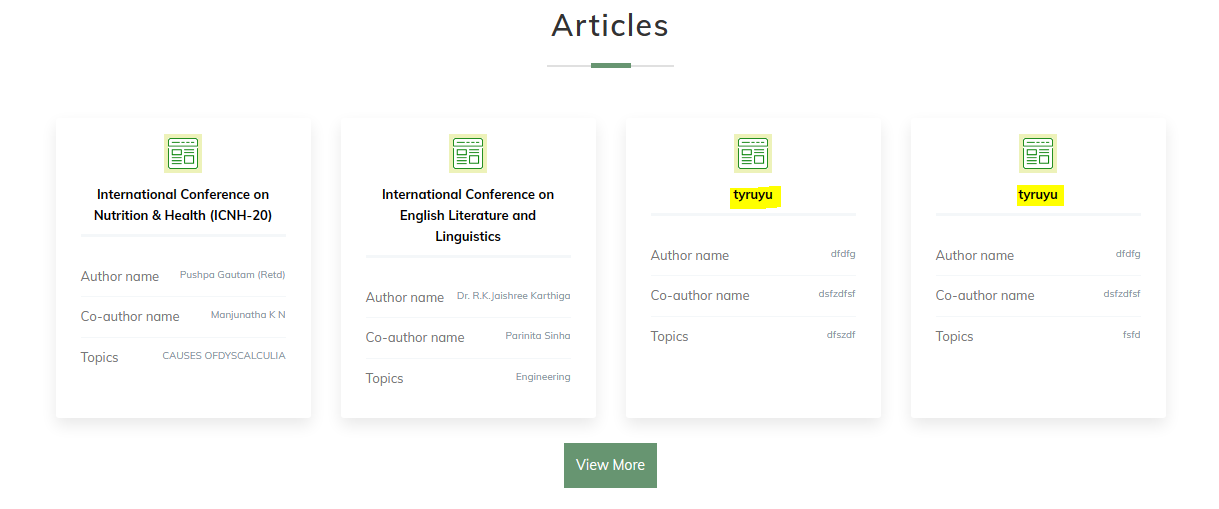Half an hour before the start of her session on the day of the conference, University of the Witwatersrand associate professor Marike Venter de Villiers logged on to the link provided.
Forty-five minutes later, she was still waiting to be let in. So she emailed the organisers. They did not respond. She was due to present at the same time as two others, so she also emailed them after looking them up online.
“I told them, ‘the three of us are supposed to present now, the link doesn't work, are you having the same problem?’” They did not reply either.
“So then I was like okay, well, this is actually happening, it’s a scam. I am not sure if they were part of the scam or not,” she told Africa Check.
When the organisers eventually replied, they offered a vague apology for the non-working link and guaranteed that she would be published.
We contacted the organisers for comment on this article. We have not heard back from them.
The main purpose of attending conferences as an academic is to either get the conference proceedings - a collection of cutting edge research papers or abstracts from speakers - or to be published in one of the organiser's journals, De Villiers told us.
“Conference organisers are usually affiliated with a few accredited journals,” she said.
The organisers of the failed conference also offered her a “physical certificate of attendance”. This was despite the fact that the conference had been changed to a virtual one at the last minute.
But how did she find herself in this position in the first place?
Hindsight is 20/20
De Villiers had wanted to present her latest research and specifically sought out a business conference in France. Her search led her to a website called the International Institute for Research in Science and Technology (IIRST), where she found a conference with dates that suited her schedule.
She had never heard of the organisation before, but when she looked at their website, she saw they had many conferences taking place around the world every week.
They even “had the hour ticking off until the actual conference, it was very professional [looking],” she told Africa Check.
She then submitted an abstract of the research she intended to present. Two days later, she received an acceptance letter from the organisers.
But the conference did not exist, as she found out too late. By then she had already obtained a visa for France, where the conference was to be held, and booked flights and accommodation.
But in hindsight, there were numerous red flags. “I think the first was that [the abstract] was not peer-reviewed,” De Villiers said.
Peer review is the process by which scientific research papers are subjected to independent scrutiny by other qualified scientific experts (peers) before they are published.
She questioned this, saying that her managers had to have the abstract peer-reviewed before they would pay for her to attend the conference.
However, the organisers claimed that the peer review would only take place before the final publication. This would be after the conference.
On accepting this explanation, the organisers sent her an acceptance letter and an invoice for the conference fee. She paid R10,000 (about US$545) and was given a letter for visa purposes.
Conference suddenly changed to a virtual one
Things took a sharp turn for the worse after she had incurred further expenses, including paying for her flights and accommodation in Toulouse, the city in south-west France where the conference was supposed to be held.
The conference suddenly changed to a virtual format. In communication with her, the organisers claimed that this was due to a problem with the visas of some of the other participants.
In response, she made it clear that she had already spent money on visa fees, travel and accommodation, to which the organisers replied that the decision had already been made.
“This was about five days before I had to travel,” De Villiers said.
She decided to travel to France and join the virtual conference from there, as she was unlikely to get full refunds.
Another red flag was that a week before the conference the organisers were still working on a programme, which De Villiers had been persistent in asking for.
And with just two days to go before the conference, she still had no time slot for her presentation and no link to her session. After emailing the organisers, she was sent a link to her time slot with information about the other two people who were due to present at the same time.
But she never received the full programme. And when she asked about the publication process after the online session failed, she was ghosted. “I never heard from them again”, she said.
Like many online schemes Africa Check has seen, many predatory conferences are in it for the profit, primarily from high registration fees. And with the rise of technology in today's digital age, fraudsters can easily infiltrate the virtual space to deceive people.
To help you avoid this type of scam, we've put together some tips from De Villiers' experience.
1. Spelling and grammatical errors: Not always foolproof, but often a useful red flag
Often, the first red flag of a scam is grammar and spelling errors. Poorly written emails or social media posts should raise suspicion.
The communications from the conference organisers are a case in point. The acceptance letter was riddled with poor grammar, which is odd given that the organiser is an 'Alex Stewart' whose first language would likely be English.
The fonts and their colours also changed a lot, with the whole letter resembling a kaleidoscope.
Reputable conference organisers check their information thoroughly before sending it out, meaning fewer glaring spelling and grammatical errors.
That said, such errors don't automatically mean the information you're looking at is wrong.
2. Take a microscope to the conference details
Whether you've found a conference you're interested in attending or have been proactively approached to attend one, it's important to double-check the information provided.
We scoured the conference’s website, looking for any signs that it might not be legitimate. There were a number.
It was remarkably light on details of the organisers. It simply said (and remember our grammar warning): “International Institute for Research in science and technology. (IIRST) is internationally recognized globally operating multidisciplinary professional research and development association.”
There is also no physical address listed anywhere on the website, including the “Contact Us” page, another red flag.
Also, clicking on all the social media buttons on the site just took us back to the top of the first page. This could be a website development issue, but it does look suspicious.
The website also has some details that made us skeptical. For example, under the “ACADEMIC RESEARCH LIBRARY” menu there are two articles listed with headings, author names, co-author names and topics. However, in the two articles that follow, it looks as if the organisers randomly pushed keys on their computer to fill in the blanks.

If the conference has a physical address listed, check the location on Google Maps or another mapping service to confirm that it actually exists.
It's also a good idea to directly contact the conference venue to see if they have any bookings for the event.
3. Check the conversations around the conference
For more complex predatory conferences, the red flags around location may not be as obvious.
However, you can check with reputable industry bodies to see if the conference has previously been listed as potentially fraught with fraud.
A quick Google search of the IIRST website brings up a conversation on ResearchGate where several users question its validity.
ResearchGate is a social networking site designed specifically for scientists and researchers to share papers, ask and answer questions, and find collaborators.
A look at the conference organiser's website also shows that it has an impossibly high number of events planned, atypical of legitimate organisers.
4. It's in the detail: missing reviews and incomplete programmes
All conferences are different, but there are standards that organisers should meet to be considered credible. Look out for any details that seem out of the ordinary.
For example, the organisers of academic conferences usually ask speakers to submit an abstract of the work to be presented. This paper is then reviewed by two or three referees. Often changes are made and the paper is sent back with possible changes before the organisers issue a letter of acceptance.
However, the organisers of predatory conferences often quickly issue acceptance letters without peer reviewing the submitted abstract. The goal is to accept as many submissions as possible to maximise their money.
The IIRST conference also had an overly broad theme - International Conference on Business, Economics and Management. This is often a trick designed to attract as many submissions as possible.
5. Trust your gut
Predatory conferences can scam people out of their time, money and personal information. A golden rule is that if something seems too good to be true, it probably is.
Anything that raises your suspicions in the run-up to a conference should be investigated further before you commit to attending.
For example, the IIRST conference suddenly switched to a virtual format. This may have been normal at the height of Covid-19, when conferences were forced to go virtual to comply with social distancing rules.
However, such sudden material changes to the schedule by the organisers of a conference, post-pandemic, is a cause for suspicion.
Another red flag came in the form of an incomplete programme hours before the conference was due to start. De Villiers never received the full programme despite several requests.
Participants should also insist on feedback on a submitted abstract before making any decisions based on the resulting acceptance letter, and ensure that the full conference programme is provided.
Also, if possible, stick to larger, more well-known conferences, although not all smaller conferences are predatory.
At the end of the day, if something about a conference just doesn't feel right, take a good look - it could save you a lot of regret.







Add new comment